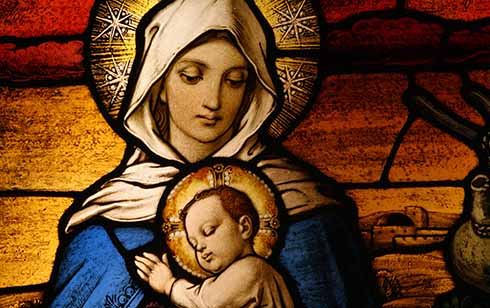 Mary knew from the moment the Angel Gabriel spoke to her that it would require supernatural cooperation to allow God’s plans to play out in her life.
Mary knew from the moment the Angel Gabriel spoke to her that it would require supernatural cooperation to allow God’s plans to play out in her life.
Her response revealed a willingness to accept God’s invitation: ‘I am the Lord’s servant. Let everything you’ve said happen to me’ (Luke 1:38). In The Grace of Yes: Eight Virtues for Generous Living, Lisa Hendey points out that while our yes to God is important, we must also be willing to say ‘no’ to our own agendas, needs and hopes. How often are we tempted to push our own plans onto God, to be in control, allowing anxiety to dominate our decisions, or slipping into frustration because of the situations we find ourselves in? For all that takes place in Mary’s life, we don’t hear of such a response. She offers the exact opposite, a model of discipleship that was full grace. Her ‘yes’ is a silent nod to God through her life, particularly through the trials of Jesus’s passion.
PARENTS' RESPONSIBILITY
Parents have an awesome responsibility to raise children who can make good choices, love others, and follow their hearts, but they must allow the freedom to do this independently. As children find their independence and set out into adulthood, parents experience a letting go. It is a joy to see young adults blazing new trails, but this independence can also lead to disappointment in the paths chosen. Loving parents accept that their child’s choices are beyond their control and that their hopes and dreams may not always be aligned. Many parents raise their children in the faith to later watch them shed their religious practices as young adults. What more can they do than ask the Holy Spirit to guide their child? No doubt Mary wondered about the choices Jesus made and yet, we don’t see her intervening in Jesus’s life, other than to encourage him at the Wedding at Cana. She stood firm as Jesus made his decision to place the lives of others ahead of his own.
In Mel Gibson’s Passion of the Christ, Jesus falls under the weight of the cross and Mary recalls a scene of her child running care free and tripping over. It is a heart gripping moment for every parent who knows the feeling of seeing their child fall and cry out in pain. We resist the temptation to smother our children in bubble wrap in order to protect from injury, because we know that our children must experience the world and all its adventures, risks and dangers. When our children suffer we feel their pain and naturally want to remove it, but Mary somehow understood that the suffering of Jesus was necessary and she resisted the urge to take the yoke from Him.
Kathy Thomas had the experience of being unable to remove the suffering of her child. She writes: ‘covered in his blood, I stood silently, alone in the hospital room, watching my baby breathe with my hand carefully placed on his back, hoping to feel his heart still beating’. Like Mary at Calvary, Kathy recalls how she was ‘speechless as I endured the “privilege” that most people will never experience of literally being covered in the innocent blood of my beloved son. There is a depth of the gospel that is incomprehensible until you have experienced such a thing.’
MARY'S ENDURING FAITH
The enduring nature of Mary’s faith in God’s promise is revealed as Jesus dies on the cross. In a reflection on Mary, Cardinal Barbarin was struck by ‘how she continues to believe in God’s Word when, before her eyes, the exact opposite of what was promised and announced happens. When Jesus was on the cross, she [may have] remembered the words of the angel: “He will be great, He will be called the Son of the Most High … He will reign forever” ... She continues to believe the truth of these impossible words.’ Mary had faith in God’s ability to make all things possible.
In his final moments of life, Jesus offers Mary hope, as she kneels at the foot of the cross with John the beloved disciple. In Theotokos: Woman, Mother, Disciple, Pope John Paul II wrote of the significance of Jesus’ words ‘Behold your son.’ With these words Jesus made ‘Mary the mother of John, and of all the disciples destined to receive the gift of divine grace … In the Lord's choice we can see his concern that this mother should not be interpreted in a vague way, but should point to Mary's intense, personal relationship with individual Christians.’ Even through her unimaginable suffering, Mary adopts us as spiritual children and models a discipleship that is based on the hope of God’s promise. Despite an inability to fully comprehend all that has taken place, Mary knows that the story cannot be over. She patiently awaits the next chapter.
HER SON'S GREATNESS REVEALED
While the Gospels mention various appearances of the resurrected Christ, there is no recorded meeting between Jesus and his Mother. Pope John Paul II invites us to consider that it is legitimate to think Mary was the first person that Jesus chose to appear to, on account of her faithfulness. When the group of women who went to the tomb return to the disciples with the joyful news of Jesus’s resurrection it is easy to imagine Mary quietly smiling that the greatness of her Son has finally been revealed to all.
Mary’s life reflects a silent, inward knowing. Mary’s pondering draws the fragmented pieces of Jesus’s life together in her heart; the celebrations, healings, laughter and tears. This Easter, may we join Mary in her humble yes to the Passion and participate in the mystery of God’s plan in our lives.